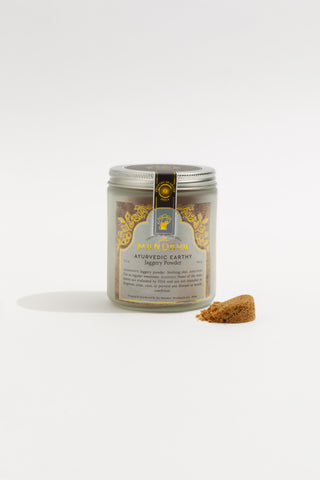
Jaggery Powder: Nature's Sweet Treasure by The Mandara
The history of sugarcane cultivation and the production of jaggery powder dates back thousands of years. Sugarcane, a tropical plant, was first domesticated in Southeast Asia and later spread to other parts of the world, including India. Ancient Indian texts, such as the Rigveda, mention the use of sugarcane for its sweet juice.

What is Jaggery
Jaggery, often referred to as "Gur" in India, is a natural sweetener made from the juice of sugarcane or palm trees. It undergoes a traditional process of extraction, clarification, and evaporation to produce a concentrated, unrefined sugar product. Unlike white sugar, jaggery retains its natural nutrients and minerals, making it a healthier alternative.
How Are Sugarcanes Cultivated for Jaggery
Sugarcane cultivation involves planting sugarcane stalks in well-prepared soil. These tall, grass-like plants require a tropical climate with regular rainfall. The sugarcane fields are meticulously maintained, and the canes are harvested when they reach maturity, usually after 10-18 months. It is very important that sugarcanes are Organic. At Mandara, we cultivate our Jaggery from organic sugarcanes grown from single source, healthy farms.
How is Jaggery Made
The process of making jaggery involves several steps:
- Extraction: Sugarcane juice is extracted by crushing the canes in a mill or by hand. Palm jaggery is similarly obtained from the sap of palm trees.
- Clarification: The juice is strained to remove impurities and heated to clarify it.
- Concentration: The clarified juice is boiled in large, shallow pans until it thickens and solidifies.
- Molding: The thickened juice is poured into molds to cool and harden, forming jaggery blocks or cakes.
Nutrients in Jaggery
Jaggery is a nutritional powerhouse, containing essential vitamins and minerals. It is a rich source of iron, magnesium, potassium, and calcium. Additionally, jaggery provides energy in the form of natural sugars.
Iron Content in Jaggery
One of the standout features of jaggery is its high iron content. This makes it a valuable addition to the diet, particularly for individuals with iron-deficiency anemia. Consuming jaggery regularly can help boost hemoglobin levels and combat fatigue.
Why is Jaggery Beneficial
Jaggery offers a range of health benefits:
- Digestive Health: Jaggery aids digestion and helps prevent constipation. It stimulates the digestive enzymes and acts as a natural cleansing agent for the body.
- Respiratory Health: Jaggery is often recommended as a remedy for respiratory issues, including coughs and asthma. It helps clear the respiratory tract.
- Blood Purification: Jaggery's iron content supports blood purification and circulation.
- Immunity: The antioxidants in jaggery boost the immune system, protecting the body from infections.
How to Test the Quality of Jaggery
To ensure you're getting high-quality jaggery:
- Color: Look for jaggery that is dark brown in color, as this indicates a higher mineral content.
- Texture: Quality jaggery is soft and not too hard. It should crumble easily. Powdered, soft Jaggery is even superior.
- Taste: Authentic jaggery has a rich, sweet flavor with earthy undertones.
Where to Buy Jaggery
You can find jaggery in various forms, including blocks, powder, and even jaggery syrup, at local markets, health food stores, or online. Look for organic and natural options to ensure the best quality. We offer organic Jaggery powder at Mandara as well and we are extremely proud to offer the highest and purest quality that promises what it claims!
Ayurvedic Benefits of Jaggery
In Ayurveda, jaggery is highly regarded for its ability to balance the doshas, particularly Vata and Pitta. It is used in various Ayurvedic formulations to enhance the effectiveness of herbal remedies.
How to Use Jaggery
Jaggery can be used in numerous ways:
- Sweetener: Use it as a natural sweetener in teas, desserts, and cooking.
- Cough Remedy: Mix jaggery with warm water or ginger to soothe coughs and sore throats.
- Energy Boost: Consume jaggery before workouts for an energy boost.
Cautions with Jaggery
While jaggery is generally safe for most people, individuals with diabetes should consume it in moderation due to its natural sugar content. Additionally, excessive consumption may lead to weight gain. If you are suffering with Kapha disorders, etc. , it is advised to consult an Ayurvedic practitioner to help with tailoring a food plan.
Interesting Facts About Jaggery
Jaggery is often used as an offering in Indian temples.
It has been a traditional remedy for menstrual cramps and bloating.
Jaggery is a key ingredient in various Indian sweets, such as "gulab jamun" and "ladoos."
Conclusion
Jaggery powder, also known as nature's sweet treasure, is a healthy and versatile alternative to refined sugar. Rich in essential minerals and Ayurvedically revered, it offers a range of health benefits and can be enjoyed in various culinary applications. At The Mandara, we embrace the holistic goodness of jaggery in our commitment to Ayurvedic wellness and natural beauty. Discover the sweetness of jaggery and elevate your well-being through this time-honored and nutritious natural sweetener.





